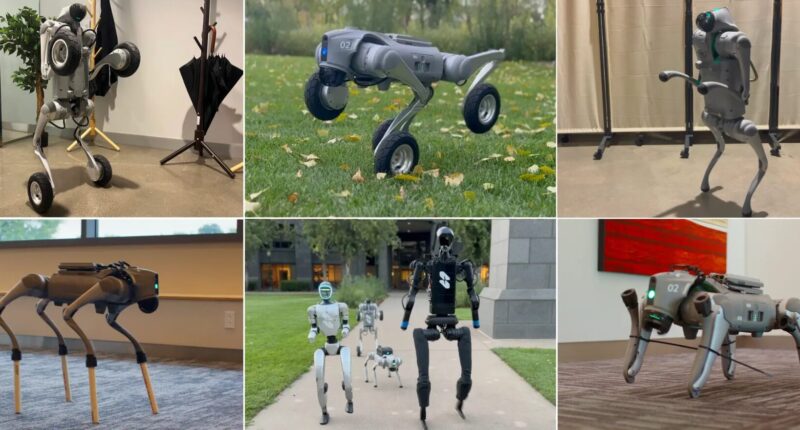Artificial intelligence startup Skild AI has developed a generalised robotic control system capable of operating on diverse hardware configurations, including robots that continue to function after limbs are removed or critical components fail.
The company’s “omni-bodied brain” approach trains a single algorithm across 100,000 different simulated robot designs rather than optimising controllers for specific hardware, enabling unprecedented adaptability to physical damage and unexpected scenarios.
“This is something we call an omni-bodied brain,” Deepak Pathak, cofounder and CEO of Skild AI told WIRED. “Any robot, any task, one brain. It is absurdly general.”
Demonstrations of the system, called Skild Brain in its full implementation and LocoFormer in academic testing, show robots adapting to extreme circumstances within seconds. A quadruped robot continued locomotion after researchers simulated leg amputation by cutting limbs to thigh level, initially struggling before discovering that large-amplitude thigh joint movements enabled effective movement within 7-8 seconds.
The system achieves adaptation through training across massive hardware diversity rather than specialising for individual platforms. When algorithms memorise solutions for specific robots, they fail catastrophically when encountering unexpected situations, according to Skild’s research.
The approach addresses a fundamental robotics challenge where impressive laboratory demonstrations fail in real-world deployment due to unpredictable conditions. By training across thousands of body configurations, the AI cannot memorise specific solutions and must develop generalised adaptation strategies.
Testing reveals remarkable flexibility across hardware modifications. When researchers locked the knee joints of a quadruped, converting it into a three-legged system, the robot initially tipped forward before learning to redistribute its weight and walk within 2-3 seconds. A similar adaptation occurred when wheel mechanisms were disabled, forcing wheeled robots to adopt walking gaits before reverting to rolling when the wheels were reactivated.
The system demonstrates in-context learning capabilities similar to those of large language models, utilising previous failure experiences to enhance subsequent performance. When a four-legged robot was placed upright and initially fell while attempting to walk on its hind legs like a humanoid, it successfully adapted after researchers provided the failure data as context for subsequent attempts.
Additional experiments showed that robots adapted to stilts attached to their legs, extending limb length beyond the training parameters. Despite initial instability caused by the raised centre of mass, robots adjusted their step timing and foot placement to achieve stable locomotion.
The technology extends beyond locomotion to manipulation tasks, with Skild Brain controlling various simulated robot arms and adapting to environmental changes such as reduced lighting conditions. The company is already collaborating with firms deploying robotic arms in industrial applications.
Skild’s approach contrasts with competitors like Toyota Research Institute and Physical Intelligence, which focus on cross-embodied learning across fewer hardware types. The startup’s emphasis on extreme generalisation across maximum hardware diversity represents a distinct strategy for achieving robotic intelligence.
The company raised $300 million in 2024 at a $1.5 billion valuation, positioning it among the highest-funded robotics AI startups. The financing reflects investor confidence in foundational AI approaches that could enable the widespread deployment of robotics across various industries.
Skild’s research suggests that reliable artificial general intelligence for physical applications requires adaptation capabilities rather than memorisation of specific scenarios. The company believes training models to control diverse robotic embodiments represents the path toward robots capable of assisting humans across factories, hospitals and domestic environments.











